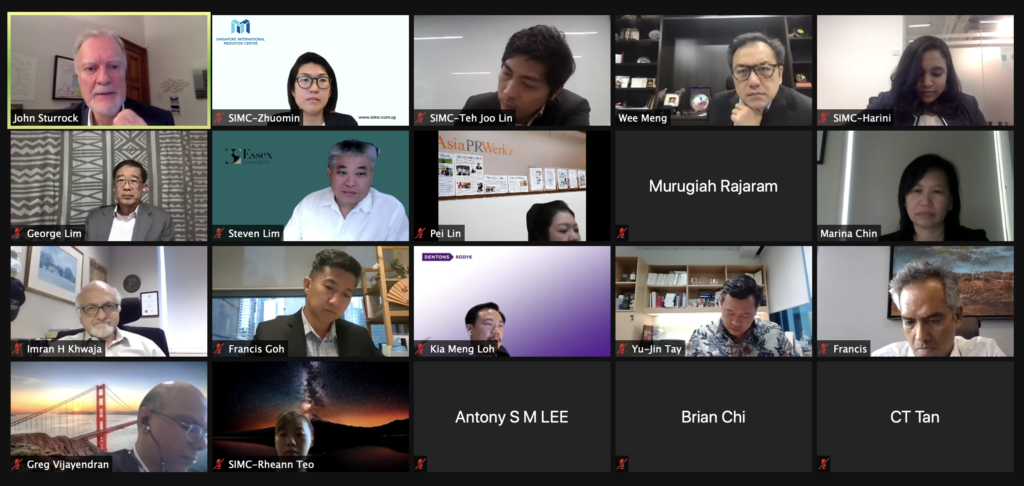Top Mediator reflects on successful switch to mediating online

Online Mediation Masterclass with John Sturrock QC
When the UK Government imposed a lockdown in Mar 2020, John Sturrock QC thought that mediations would dry up.
To the leading international commercial mediator, the process was “highly personal” and required physical presence. He said: “When the lockdown occurred for us at the end of March, as far as I was concerned, this marked the end of my business and my work would simply stop.”
But he soon proved himself wrong.
John, who on 3 Dec 2020 spoke to some 15 specialist mediators from Singapore in SIMC’s inaugural masterclass for specialist mediators, said: “I could not conceive conducting business online. I had not heard of Zoom at the beginning of March… so it is remarkable for me to be here and tell you that most of my business is now conducted via Zoom and occasionally, [Microsoft] Teams today.
“At the moment, I seem to be as busy as I’ve been for quite a while. I have conducted many mediations online. And it works.”
John, who is on SIMC’s International Mediator panel and a SIMI Certified Mediator, has mediated many hundreds of disputes in a wide range of commercial, professional, public sector, political and other settings (see profile here). He is the Founder and Senior Mediator at Core Solutions, Edinburgh, and a mediator at Brick Court Chambers, London.
While the online masterclass was originally scheduled for an hour, the level of engagement was so high that it lasted for close to two hours. We summarised the highlights of the session, including 10 takeaways that John shared on mediating successfully online.
Mediating Successfully Online
- Practise practise practise
Practice makes perfect. As the mediator assumes the role of a choreographer to facilitate discussions, it is important to learn the techniques and procedures of conducting mediations virtually, and how to exploit the advantages of online tools – all this can only come with practice. Before proceeding to conduct mediations online, John scheduled a number of test sessions with his team to rehearse leading the sessions virtually.
- It’s not online mediation…
“Let’s not call this ‘online mediation’ but ‘mediation using an online facility,’” said John. Reframing our perception of technology is important to understand that we are not a slave to it. Instead, online platforms are another medium, extra tools in the bag. We are still leaning into the same processes and techniques of mediation; while adjusting what we normally do in a face-to-face situation and utilising our skills online.
- Saving time, cost… and the environment
Mediating using online technology can add value as it provides greater savings in terms of time and travel. It also enables participants to feel comfortable and often times, safer, given the familiarity with their homes or offices. Particularly in a time of climate change, John stressed the environmental benefits of cutting back on travel: “I recently signed up for the Mediators’ Green Pledge where we commit to conducting mediations in an environmentally friendly way. The view of some mediators is that even after the pandemic, around 60 per cent of mediations will be conducted online. We will have that choice.
- An intimate experience
Mediating online can be extraordinarily intimate. John shared that he has had some of the most transparent and candid conversations with parties and with counsel on the reality of the situations and negotiations in which they are involved. You still need to take time to build rapport of course.
- Agency and autonomy
Mediation traditionally allows the parties to have more autonomy in making decisions about their dispute. Through online mediation, clients are more empowered in the process as everyone can have equal screen presence. The ease of setting up breakout rooms also allows for more flexibility as mediators can easily meet with clients alone without counsel if that seems appropriate.
- Meeting anytime, anywhere
Rather than a process that is limited to the classic full day of negotiations, mediation becomes more of a continuum where parties can meet comfortably online over a series of shorter sessions.
- Have a Plan B
Mediators should acquire the appropriate devices and necessary contingency plans to ensure the sessions run smoothly. This might include upgrading connectivity, using an Ethernet cable and enhancing visibility by utilising a second screen. Mediators should have a backup protocol for when technology fails so that the session can resume as seamlessly as possible. Remember that we still have email, phone and text available.
- Communicate!
Make good use of the facilities that online platforms offer. Mediators should be familiar with the flexibility that online tools provide such as setting up breakout rooms and screen sharing. Also, it is important to communicate about practical matters early in the session so that participants are aware of what will occur, such as movement between different rooms.
- Preparation
Mediators need to be aware of the many practicalities they will have to navigate as they transition online. This includes ensuring parties and counsels are well-prepared and expectations are fleshed out prior to the sessions. For example, mediators might choose to brief participants on the technical aspects of the use of an online platform for mediation and provide the option of using presentations or visual aids to enhance negotiations. Online signing protocols are necessary also.
- Be yourself
Cliché as it sounds, mediators should be authentic with their participants. As John said, “Be yourself, be thoughtful and smile during the sessions!”
Toward the end of the session John answered some of the questions posed by the specialist mediators.
One of SIMC’s specialist mediators, Mr Gregory Vijayendran, SC, asked, “While there are benefits to online mediation, how do we manage the constraint of not being able to meet in person to build rapport?”
John accepted that there are some downsides to working online; for example, casual meetings don’t occur so easily and personal touch is not possible. Nevertheless, he believed that it was very possible to build rapport online. He added, that could require mediators to spend extra time scheduling initial meetings to build a relationship with clients before the main session.
Another participant, Mr Imran H Khwaja posed the question on whether mediations conducted in Singapore stood to reap the full benefit of lower cost and time spent travelling as the country is relatively small and well connected.
John responded that, “Apart from time and cost efficiency, there is still great value in conducting mediations virtually. One being, parties now have the option of participating in the sessions within the safety and comfort of their own homes. With the current push to move many of our operations online, many professionals have been forced to be more thoughtful of the personal comfort and the psychological safety of all participants regardless of whether the mediation is conducted online or in person.”

